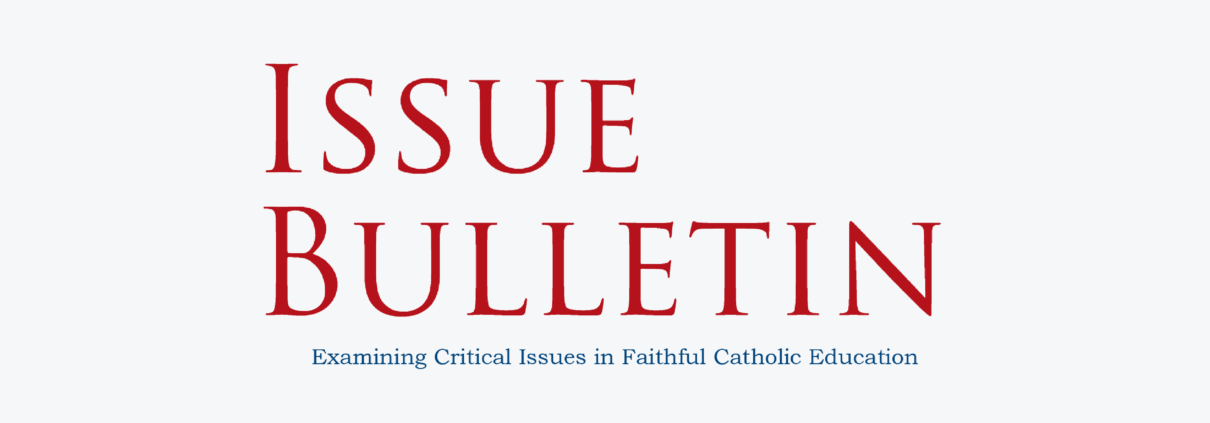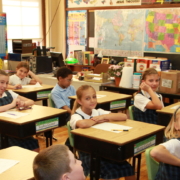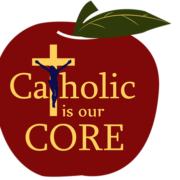Catholic Education in America: Accountable to the Church or the Feds?
This is part of a series of reports on the Common Core State Standards Initative and its potential impact on Catholic education.
Catholic schools in America have flourished in large part because of their relative independence from outside influences. But the recent adoption by many Catholic schools of the Common Core standards and tests threatens their ability to fulfill their mission and be faithful to a Catholic vision of education.
The Common Core is a bureaucratic effort to further centralize control over education in America. Seduced by federal incentives, 45 states agreed to adopt the Common Core in 2009. As schools implement the standards one thing grows clear: the Common Core weakens their ability to direct what they teach the children in their care. This is particularly problematic for Catholic education.
Heather Crossin’s third-grade daughter goes to a Catholic school in Indiana. Heather says that when her daughter came home from school with a text book aligned with Common Core, she realized control over what her child was taught had not only left the school building—it had left the state.
In the 45 states that have signed on to the Common Core, parents who send their children to public schools will soon see this scenario play out. But it is increasingly a reality in private and Catholic education too.
Many dioceses and archdioceses have decided to implement or “adopt” the Common Core national standards. Last May, the National Catholic Educational Association (NCEA) issued a statement offering its full support of the standards, arguing that implementation would not hinder the teaching of the Catholic Church.
However, Common Core standards are problematic for all of America’s schools—private and public. Since the majority of Catholic children are educated in our nation’s public schools, Catholic parents should be concerned about whether their local school district, their local principal and their children’s primary teachers have ceded authority to bureaucratic “experts” in Washington, D.C.
A true “common core” teaching of Catholic social thought is the principle of subsidiarity, which counsels that decisions be made at the most effective local level. The principle of subsidiarity empowers parents, in consultation with local teachers, schools and churches, to decide which sort of education is best for their children. The Common Core national standards say the opposite: that educational decision-making is best made at the national level.
Common Core aims to impose one set of standards defining what every public school student in America will learn. As a result of textbook spillover, state regulations and concerns about college-test preparations, many private and parochial schools will be subject to Common Core as well.
They shouldn’t.
The mission of Catholic education is to cultivate the moral and intellectual development of all students, forming their hearts and minds by orienting them to their identity in Christ and His Church while providing an excellent academic education. Catholic education, by its very nature, requires that local parishes and parents be in charge of the educational decision- making that prepares students for this life, and the life after.
But Common Core is oriented toward different ends.
Since Washington got involved in education with the 1965 Elementary and Secondary Education Act, the federal government has spent over $2 trillion on K-12 education, tying the hands of local school leaders with red tape and further burdening education with the bureaucracy of an ever-growing administrative state.
Educational achievement has flat-lined despite a near tripling of inflation-adjusted, per-pupil spending by the federal government. High school seniors are no better off today than the seniors of the 1970s. Graduation rates for disadvantaged students have remained stagnant. The United States continues to fall behind international competitors.
The federal government’s solution? Spend more money and usurp more authority from states and parents over what children are being taught. The Common Core is an extension of this misguided logic—and it is covered with federal fingerprints.
Developed in 2009 by private interest groups in Washington, Common Core was immediately incentivized by the federal government. The Obama administration offered $4.35 billion through Race to the Top, a competitive grant program. Perhaps even more enticing, the administration circumvented Congress by offering waivers to states—and now local school districts—from the No Child Left Behind law if they adopted Common Core.
Nearly every state that received a waiver used Common Core to meet the federal requirement to adopt “college and career-ready” standards. The government also directly financed the two national testing consortia—the Partnership for Assessment of Readiness for College and Careers (PARCC) and the Smarter Balanced Assessment—tasked with designing Common Core-aligned assessments. Finally, the U.S. Department of Education created a bureaucratically titled “Technical Review Panel” to oversee assessment items.
Not only is Common Core costly in terms of educational liberty, it will also financially strap states and schools.
A study released by the Pioneer Institute for Public Policy estimates that the cost to states of implementing Common Core will reach $16 billion over the next seven years. Nearly half of the states that have agreed to adopt Common Core already are seeing their testing costs double under the Washington-approved standards.
Despite evident threats imposed by Common Core, states, schools, and districts press on with implementation. But concerns are growing louder and harder to ignore.
In October, 132 Catholic professors signed a letter sent to each Catholic bishop in the United States, outlining the threat Common Core poses to Catholic education.
The professors’ plea:
We write to you because of what the particular deficiencies of Common Core reveal about the philosophy and the basic aims of the reform. We write to you because we think that this philosophy and these aims will undermine Catholic education and dramatically diminish our children’s horizons. Promoters of the Common Core say that it is designed to make America’s children ‘college and career ready.’ We instead judge Common Core to be a recipe for standardized workforce preparation. Common Core shortchanges the central goals of all sound education and surely those of Catholic education: to grow in the virtues necessary to know, love, and serve the Lord, to mature into a responsible democratic self-government. Common Core adopts a bottom-line, pragmatic approach to education.
The deficiencies in Common Core noted by the professors stem from analyses by James Milgram, professor emeritus of mathematics at Stanford, and Sandra Stotsky, professor of education reform emerita at University of Arkansas, both of whom sat on Common Core’s review committee. They dismissed themselves before the release of the standards because of their concerns with the content.
Dr. Milgram says the mathematics standards will put American students two grades behind international peers by the time they reach seventh grade. Common Core’s sequencing pushes Algebra I off until ninth grade, when most states had been moving toward Algebra I in eighth grade. The delay makes students less ready for most four-year universities.
Dr. Stotsky has similar concerns with the content of the English standards. The diminished emphasis on literature, she says, “makes it unlikely that American students will study a meaningful range of culturally and historically significant literary works before graduation.” She also argues that emphasizing informational text over literature “may lead to a decreased capacity for analytical thinking.”
Catholic schools should not turn over control of curriculum to anonymous boards of experts. Catholic education should recognize the potential in all students and the value of liberal learning regardless of career choices.
Some may argue that because the SAT and ACT college entrance exams have been aligned to the national standards, Catholic schools must adopt them so that their students do well on those exams. This is unlikely to be so.
By and large, Catholic school students outperform public school students by a significant margin. According to the 2013 National Assessment of Educational Progress, 49 percent of Catholic school eighth-graders are proficient in reading compared to 31 percent of public school students. Also, 33 percent of Catholic school eighth-graders are proficient in mathematics compared to 26 percent of their peers in public school.
If Common Core pushes back Algebra I by two grade levels for most public schools, what effect will it have on math achievement in Catholic schools?
If Catholic school students significantly outperform public-school counterparts in English because Catholic curricula emphasize literature, what will happen when Catholic schools implement Common Core with its emphasis on informational text such as EPA manuals and executive orders?
The letter from Catholic professors expands on this point:
The history of Catholic education is rich in tradition and excellence. It embraces the academic inheritance of St. Anselm, St. Augustine, St. Thomas Aquinas, and the Blessed John Henry Newman. In contrast to such academic rigor, the Common Core standards lack an empirical evidentiary basis and have not been field-tested anywhere.
What great works will Catholic school teachers have to give up to make room for the mandated dose of bureaucratically sanctioned informational texts?
It’s not too late for Catholic schools to reject Common Core, this latest federal overreach. It’s not too late to reclaim all that makes Catholic education unique and reflects the values of Catholic families. It’s not too late to ensure that local parishes and schools are in the driver’s seat when it comes to defining curricula for our children.



 St. Agnes School, St. Paul, MN
St. Agnes School, St. Paul, MN 


